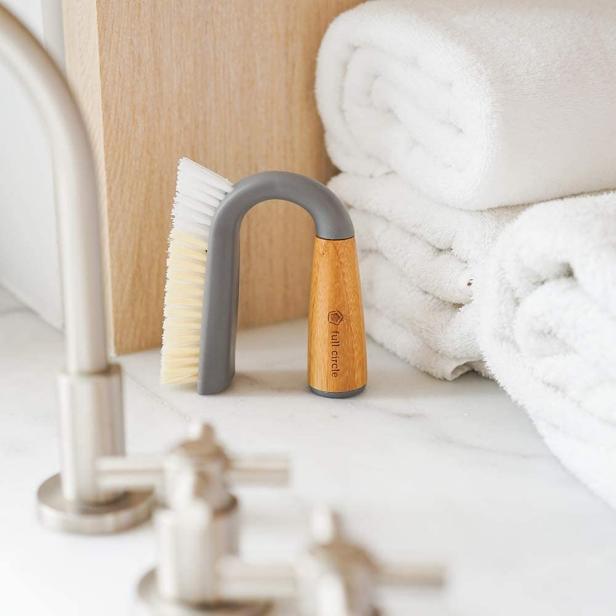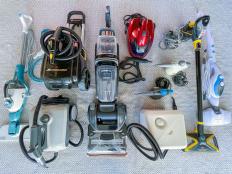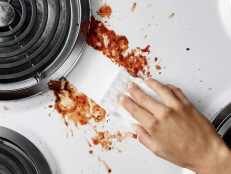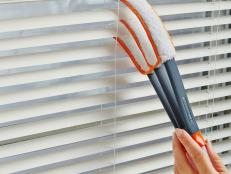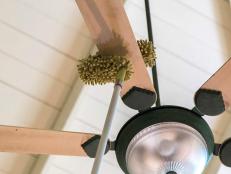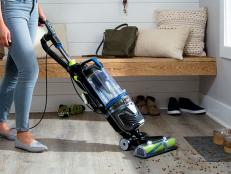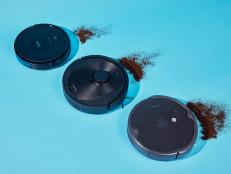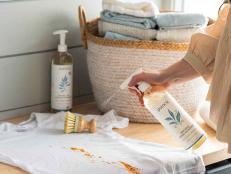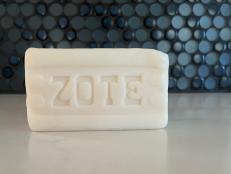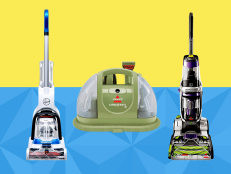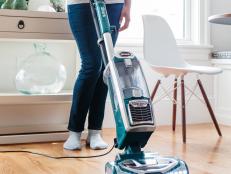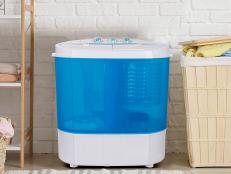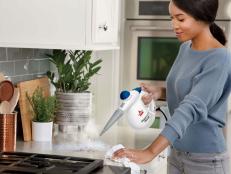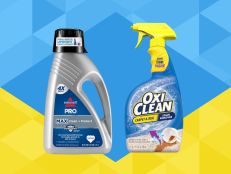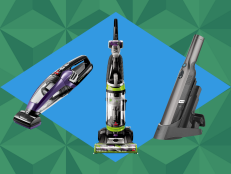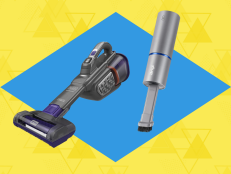The Best Grout Cleaners and Brushes of 2024, Tested and Reviewed
Whether your grout is just old and yellowed or has mold and mildew buildup, grab one of these hard-working cleaning solutions and grout scrub brushes to make this arduous chore much easier.

Our Top Grout Cleaner Picks
- Best Overall: Black Diamond Ultimate Grout Cleaner
- Best Gel: Soft Scrub With Bleach Cleaner Gel
- Best for Natural Stone: Granite Gold Grout Cleaner
- Best Long-Lasting: Microban 24-Hour Bathroom Cleaner
- Best DIY Cleaner: Baking Soda, Hydrogen Peroxide + Soap
Our Top Grout Brush Picks
- Best Overall: Full Circle Grunge Buster Grout + Tile Brush
- Best Detail: OXO Deep Clean Brush Set
- Best Electric: Rubbermaid Power Scrubber
- Best Multipurpose: Drill Brush Tile + Grout Cleaning Kit
- Best for Large Jobs: Grout Brush With Extendable Handle
Grout is one of those hard-to-clean places that often gets neglected in regular cleaning and then becomes more of a pain to clean over time, resulting in dingy, yellowed-looking grout — or worse — moldy grout. Since grout is often indented between tiles and is more porous than other surfaces, it absorbs dirt, grime and water more than most surfaces and can require extra elbow grease, stiff scrub brushes and specific cleaners to effectively clean. The right cleaner and brush can make the job much easier, though. Plus, it's super satisfying to see dingy grout become sparkling white again. There are several important factors to consider when choosing a grout cleaner to tackle these stubborn stains.
First, what kind of stains do you have? If you have floor tile that gets a lot of foot traffic and simply has dirt buildup, you might not need a very strong cleaner, but if you have tile in a bathroom that doesn't get great ventilation and has started to grow mildew or mold, you might need a stronger solution with bleach to minimize the amount of scrubbing required.
You'll also need to consider what kind of surface your grout is in and read the product label — it's always a good idea to test the cleaner on a small, inconspicuous area before tackling the rest of the surface, too. Natural stone like marble, for example, is more porous and can discolor under harsh cleaners, but ceramic and porcelain tile can handle cleaners containing bleach. Whether or not you have white or colored grout is also important to think about since cleaners with whitening agents like bleach could discolor grout that's not white unevenly. Knowing what surface you can use grout cleaner on will also help you understand how multipurpose it is and whether or not you can use it on other areas of your home as well.
Lastly, the form of the cleaner is important to take into account. Most cleaners come as sprays or foam sprays, which are easy to apply but can be difficult to use on vertical surfaces as they drip easily. Gels stay in play better but require a little more rinsing.
When choosing a good grout brush, you want one with stiff bristles; many people use old toothbrushes, which will work okay for a few jobs, but will eventually become frayed and require more elbow grease. Speaking of elbow grease, if you don't want to use as much, an electric brush is a good choice because it does the hard work for you. For regular brushes, a narrow or angled brush is helpful for targeting grout lines, and a brush head with a larger surface area will come in handy if you have a large floor to tackle.
For a great multipurpose grout cleaner, we recommend this fast-acting spray from Black Diamond. It works on dirt, grease, grime, soap scum, food spills and stains, and it doesn't contain a bleaching agent, so it's safe to use on any color of grout and natural stones. You only have to let the cleaner sit for a couple of minutes before scrubbing and rinsing to achieve great results versus triple the time for some of the other cleaners we tested. Our tester saw significant brightening on her grout after using this spray. While this cleaner will be sufficient for most grouted surfaces, it's not ideal for heavy mold, mildew, calcium or water spots. It's great for quick cleans and regular maintenance, and it's easy to target a specific spot with the sprayer.
If you have old grout that you can barely tell was originally white, this is your cleaner pick. We tested this one on a decades-old tile floor and it literally made it look brand new. It brightened the white grout we tested it on more than any other cleaner we tried, and it's effective on mold and mildew. Since it's in gel form, it's easier to target than a spray, and you can use it on grout, tile, tubs, countertops, toilets and more. You just apply to the grout, rub and rinse. Since it contains bleach, this cleaner isn't recommended for colored grout, and be sure to wear gloves and avoid contact with clothing as it can discolor fabrics.
Most traditional cleaners are not recommended for use on natural stone like marble and unsealed granite as the chemicals they contain can etch natural stone. This spray from Granite Gold is formulated without acid or ammonia, so it's safe on natural stone and white and colored grout. While it's not as effective on tough stains and buildup as other cleaners on this list, it noticeably brightened our grout and worked better after sitting for 5-10 minutes. Plus, it’s biodegradable, non-toxic and food-safe, and it has a pleasant citrus scent.
If mold and mildew is your main concern, this spray cleaner can help keep the problem at bay. It kills 99.9 percent of bacteria and 99.9 percent of germs, including cold and flu viruses. Plus, it prevents the growth of mold and mildew for seven days on hard surfaces and destroys soap scum. It also has a pleasant citrus scent and can be used almost anywhere — counters, sinks, toilets, bathtubs, showers, tile, sealed granite, sealed marble, glazed tile, formica, corian and stainless steel.
Best DIY Grout Cleaner: Baking Soda, Hydrogen Peroxide + Soap
If you want to avoid harsh ingredients like bleach and prefer a natural cleaner, we tested this DIY solution using common household items and it actually cleaned our grout better than many store-bought solutions we tried. Plus, it's safe to use on white and colored grout. To make, mix together 1/2 cup of baking soda, 1/4 cup of hydrogen peroxide and 1 tsp. of dish soap. Apply cleaning mixture onto the grout, wait 5-10 minutes, scrub and rinse.
Made of bamboo and recycled plastic, this grout brush from Full Circle is the perfect shape for getting in grout lines but is also large enough to be used on tile floors, counters or tubs so you don't have to use multiple brushes for different areas of your bathroom. Plus, it's comfortable to use and rests upright for faster drying.
This two-piece brush set from OXO includes two sturdy cleaning brushes with tough bristles. The small brush has a built-in wiper blade to remove dirt from drains and crevices. We love that it can get in grout lines as well as other awkward nooks and crannies like around faucets and drains. Our tester was initially concerned the brush was going to get soft and lose its shape, but it held up really well.
If you still want a smaller brush head to easily target grout lines but want to minimize the level of elbow grease you have to put in, let this electric scrubber from Rubbermaid do the hard work for you. Oscillating heads scrubs 60 times per second, interchangeable accessory brushes give you the right tool for the job and four AA batteries are included.
For something you can literally tackle the whole bathroom with, this four-piece drill brush kit is a great multipurpose pick. The different brush heads attach to a drill (not included) and can cover every spot in a bathroom. While the drill does all the hard work for you, it is good to note that the brush tends to splatter excess grime around the bathroom that usually requires a quick wipedown.
If you have a large floor to tackle, this affordable brush with an extendable, telescoping handle will help you cover a larger area in less time. The brush head nestles right into the grout crevices, removing built-up dirt with ease. We expected the bristles to fray after our vigorous scrubbing, but they looked as stiff as when we pulled it out of the box. Plus, it's slender and easy to store.
How We Tested
After researching the many grout cleaner options and best grout brushes and reading customer reviews and ratings, we tested eight cleaners, plus one DIY solution, and 11 brushes across our team of HGTV editors. Three different editors tested similar products in their own bathrooms, kitchens and entryways, consisting of natural stone, ceramic and porcelain tile and both white and colored grout, for side-by-side comparisons. We compared the store-bought cleaners to the same DIY grout cleaner solution (baking soda, soap and hydrogen peroxide). We followed the manufacturer's instructions on how to use the cleaner and how long to let them sit. We also noted the smells of the cleaner, protective gear needed and how easy or messy the cleaner was to use. For the brushes, we observed how hard we had to scrub to disrupt grime, how comfortable they were to hold and, for electric options, how much of a mess they made.













